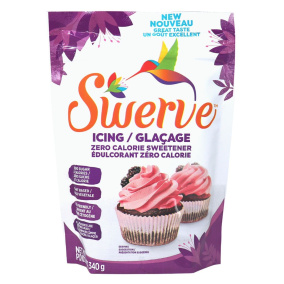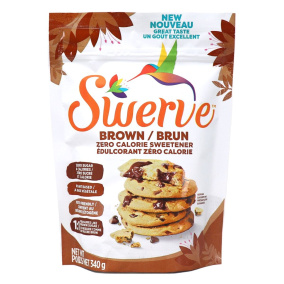
Swerve Sweetener
Baking feels easier when sweeteners measure like sugar. Swerve makes erythritol-based blends with prebiotic fibres that caramelize, brown, and bake the way you expect, so recipes come out just right. With a clean taste and no added sugar, it lets you enjoy the familiar comfort of homemade treats while keeping things lighter.
Cupcakes rise properly, cookies spread with the right texture, and sauces thicken without extra fuss. From brownies and muffins to savoury glazes and marinades, Swerve works wherever sugar usually would, giving you consistent results without the spike. It’s an easy swap for anyone following keto, managing diabetes, or simply aiming to cut back on sugar without losing flavour.
Swerve shows that a sugar alternative can stand up in the kitchen. Whether you’re baking for family, experimenting with new recipes, or just sweetening your morning coffee, it helps you keep the foods you love while feeling good about the choice.
What is Swerve
Swerve is made from ingredients found in select fruits and starchy root vegetables, and contains no artificial ingredients, preservatives or flavors. It’s zero-calorie, non-glycemic and safe for those living with diabetes, since it has no effect on blood glucose or insulin levels.
Swerve is a true sugar replacement because it's sweet and delicious! Unlike other natural sweeteners like stevia, it has no bitter aftertaste and measures just like sugar. It's also the only sugar replacement of its kind that browns and caramelizes just like sugar, so all of your favorite recipes will be a breeze.
Swerve & Diabetes
Swerve is a sweet—and smart—choice for people with diabetes. Getting used to a diabetes lifestyle can be a real challenge, but incorporating Swerve is a cinch. Making your favorite recipes safe for you to enjoy is as easy as a cup-for-cup Swerve-for-sugar swap. The Glycemic Index Laboratories in Toronto, Canada, performed a study with 15 healthy participants between the ages of 18 and 75, testing the body’s after-consumption blood glucose and insulin responses to four different sweeteners. Their results show that Swerve is non-glycemic and doesn’t raise blood glucose (blood sugar) levels. Swerve was also tested for its effect on insulin levels after consumption and was found to have an extremely minimal impact.
How Swerve is Made
The secret to Swerve’s zero-calorie sweetness is a combination of erythritol and oligosaccharides.
If you’ve ever visited a brewery, you’ve gotten a peek into how fermentation works. Erythritol is made by fermenting glucose with Moniliella pollinis, a natural microorganism. It also naturally occurs in many fruits and vegetables like melons, grapes and asparagus. Erythritol is classified by the FDA as a zero-calorie, 4-carbon sugar alcohol that does not affect blood glucose.
Oligosaccharides are sweet, non-digestible carbohydrates sourced from select fruits and starchy root vegetables. Oligosaccharides are prebiotic fibers, so they’re not only tasty, but they can help stimulate beneficial bacteria in your gut.
Erythritol vs. Xylitol
Sugar alcohols (also called polyols) are common ingredients in sugar substitutes; the erythritol in Swerve is one such sugar alcohol. Another common sugar alcohol is xylitol, which is quite different from erythritol and is not an ingredient in Swerve. Here are a few ways the two differ.
Calorie Counts:
Erythritol: 0 calories per gram
Xylitol: 2.4 calories per gram
Tummy Tolerance:
Erythritol: Little-to-no digestive disruption
Xylitol: Twice as likely as Erythritol to cause digestive disruption
Unlike other polyols, erythritol combines the unique properties of being both zero-calorie and maintaining a high digestive tolerance. The unsavory details: Because erythritol is rapidly absorbed in the small intestine and rapidly eliminated by the body within 24 hours, the laxative side effects sometimes associated with polyol consumption are unlikely when eating foods sweetened with erythritol.
Pet Safety:
Erythritol: Safe for dogs
Xylitol: Toxic to dogs
Results from a 53-week study showed that erythritol is well-tolerated by dogs and is safe for them to consume. Xylitol, however, has been shown to be fatal to dogs, due to it causing severe hypoglycemia and related liver failure. Keep your pups safe!




